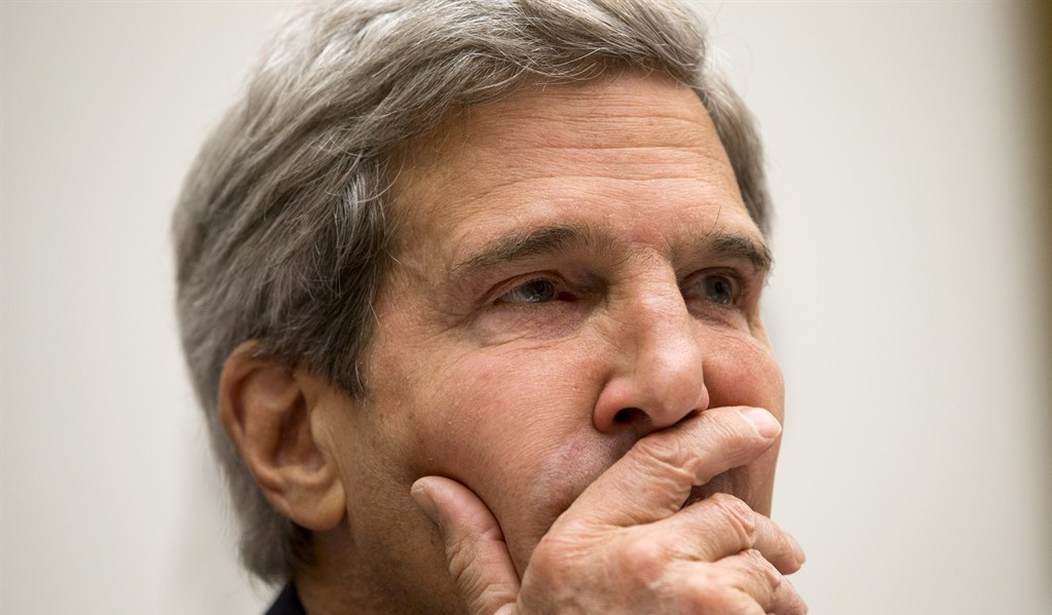The Syrian crisis is in a frenzy, Egypt's political system is imploding, a new wave of Sunni terrorism is bloodying Iraq, post-Qaddafi Libya is collapsing into lawlessness and ruin, and Iran is edging closer to the nuclear threshold. Yet Secretary of State John Kerry goes on flogging the dead horse of the Israeli-Palestinian "peace process."
On Sunday, in the midst of his (now defunct) campaign to win support for a US military strike in Syria, Kerry met for three hours with the Palestinian Authority's Mahmoud Abbas to discuss "how to intensify" the latest round of talks between Israel and the Palestinians. Earlier that day, he met with officials from the Arab League to reinforce his "commitment" to Arab-Israeli peacemaking. Everyone agreed, said Kerry, "that a final status agreement is important in enhancing regional security and stability throughout the Middle East."
The notion that an Israeli-Palestinian peace deal is key to a stable Middle East is one of those moldy myths that never seem to lose their popularity. Yet which of the conflicts now roiling the region would come to an end if Israel and the Palestinians were at peace? Syria's civil war? The bloody struggle in Egypt? The resurgence of Al Qaeda?
In a region as backward and broken as the Middle East, wrote Aaron David Miller, a former adviser to six secretaries of state, in a notable 2010 essay in Foreign Policy, "it stretches the bounds of credulity to the breaking point to argue that settling the Arab-Israeli conflict is the most critical issue." It is equally delusional to argue that a "two-state solution" is the way to settle that conflict — that the key to peace is for Israel to give up land on which the Palestinians can establish a state.
Recommended
But oh, what euphoria that delusion can induce! It was 20 years ago this week — Sept. 13, 1993 — that Yasser Arafat and Yitzhak Rabin signed the Oslo Accords on the White House lawn, launching a "peace process" that had people giddy with excitement. In exchange for Arafat's signed pledge to "renounce the use of terrorism and other acts of violence," Israel agreed to treat the PLO as a legitimate Palestinian government, and to empower Arafat with land, money, weapons, and political control. I was in the audience that day, watching as President Clinton coaxed Rabin into shaking Arafat's hand. The elation in the air was almost palpable. Peace was coming to the Holy Land! Longtime enemies were calling off their war! The dream of generations was blossoming before the world's eyes!
Only this wasn't peace. It was the delicious, dangerous intoxication of appeasement. For people sick of war, it is always seductive to be told that your enemy is as hungry for peace as you are, as keen to make a deal and sign on the dotted line. Would that it were true. But you cannot make peace with an enemy who is still hell-bent on victory — victory by any means necessary, including the hijacking of a "peace process."
What Arafat and the PLO were really after was never a secret. "The goal of our struggle is the end of Israel," Arafat told Oriana Fallaci in an interview published in 1974. "Peace for us means Israel's destruction and nothing else." In Cairo that year the PLO had formally adopted its so-called "Phased Plan," agreeing to establish political control over any territory it could acquire from Israel, and then use that territory as a base of operations to continue the "armed struggle" until it had "liberated" all of Israel from the Jews.
This was not some forgotten bit of old rhetoric on the day Arafat and Rabin signed the Oslo accord. "In September 1993 alone Arafat evoked the phased strategy more than a dozen times in media appearances throughout the Arab world," historian Efraim Karsh wrote, "most notably in a personal message to the Palestinian people, broadcast in Arabic by Jordanian television" on the day of the White House ceremony. "This is the moment of return," Arafat exulted, "the moment of gaining a foothold on the first liberated Palestinian land."
Arafat died in 2004, but the raison d'etre of the Palestininan movement remains unchanged. It isn't a two-state solution, with the Jewish state of Israel coexisting peacefully alongside a sovereign state of Palestine. It is the elimination of Jews and Jewish sovereignty, an objective the Palestinian Authority has reinforced and restated in countless ways since that day on the White House lawn two decades ago.
The essential ingredient for Arab-Israeli peace is not endless negotiation, but rejection of the violence and Jew-hatred that, thanks to a generation of PLO misrule, have so crippled Palestinian society. It has been 20 years since the fiasco of the Oslo Accords. Isn't it time to stop beating that dead horse?

























Join the conversation as a VIP Member